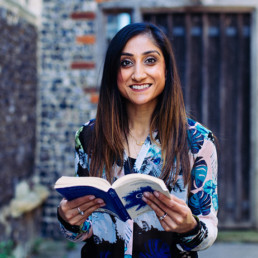
Written by Zahara Chowdhury
Zahara is founder and editor of the blog and podcast, School Should Be, a platform that explores a range of topics helping students, teachers and parents on how to ‘adult well’, together. She is a DEI lead across 2 secondary schools and advises schools on how to create positive and progressive cultures for staff and students. Zahara is a previous Head of English, Associate Senior Leader and Education and Wellbeing Consultant.
This year’s theme for SAHM is beautiful: free to be me. As we celebrate lived experiences, storytelling and authenticity, it seems only right that freedom and embracing our individual narratives is next.
This year’s theme has made me think where have I felt my most free? It’s not an easy question to answer. You see, growing up South Asian, (in my case, a British Pakistani Muslim, who’s family was born and raised in Africa), masking your identity can often feel normal, particularly when masking makes you feel safe in public, school and at work. Returning home, comes with its own comforts and conflict: finding joy in your culture and sticking out because you don’t really ‘fit’ within it either. Freedom then becomes a rather grey area and one that does not feel easily attainable.
Over the years, particularly I adulthood, there are a few spaces where I have come close to ‘free’: one was in my classroom. When teaching, my classroom was predominantly full of students who looked like me, shared similar lived experiences and most importantly we connected over an understanding of shared ambitions, aspirations and values. I felt free in an office with a colleague who shared my heritage; breaktimes and lunchtimes were full of laughter, candid conversations and asking each other, ‘what did your mum use to store atta in the kitchen?’, ‘were your sofas covered in shrink wrap too?’
Since then, I have felt most free in conversation with South Asian educators across the sector, most recently in conversation learning all about the wonders of Pehalwaan Juice (if you know you know…I definitely didn’t!). In many ways I share this with caution: for someone who works to amplify diversity, is there a problem if my freedom is sought and felt within my own community? Do I then just enjoy being a part of my own echo chamber?
The answer is no. Within these spaces diversity thrives. Diversity of thought, feelings, faith, work, experiences – being South Asian does not make us all one and the same and every South Asian friend, colleague and student I have connected with has a different story and identity. If anything, the freedom I feel in these spaces makes me more determined to centralise my identity in mainstream spaces too.
My childhood and teen years were branded with the term ‘coconut’ – in many ways, I didn’t think much of it then and I don’t think much of it now. What I do think about now though is how the identity of a ‘coconut’ lacked freedom. Consciously and subconsciously (and I really hope fellow South Asians can relate) I spent my childhood and adolescence straddling between several identities, depending on the audience – and I happened to be pretty good at it; I still am (we are pros when it comes to masking). I (still) do not know enough about my heritage, and I still don’t feel very ‘white’ either. Perhaps this is what imposter really means.
I studied all of this at university, wrote about it for my dissertation. 15 years later, specialising in a field that very much reflects the truth of my life couldn’t be more imperfectly perfect, no matter how much I question it on a daily basis (awareness and celebratory months are only one piece of the ‘work’). If anything, my experiences as a teacher and now EDI trainer, speaker and consultant are in some ways liberating and in other ways, revealing of just how far ‘we’ (marginalised and minorities in the West) have to go to be free.
South Asian Heritage is rich, diverse, nuanced and just huge – I am so naive and ignorant of its beauty. There is so much to learn. I’m not sure I’m free to be me just yet…but I think (and hope) we’ll get there soon.
In light of this and all of the learning and connections we have to make, I’m excited to share a space, network and group for South Asian Educators to connect, talk and be. Assistant Headteacher and Author, Yamina Bibi has said, the network will be a space ‘for anyone who is looking for a safe space for those of South Asian heritage. The challenges and issues facing South Asian Educators is somewhat different to those from other heritage groups as they are often thought of as the hard workers, obedient, quiet, shy, oppressed by colleagues and society in general. This network will support more educators to have their unique voices heard.’ We want this network to be collaborative, safe, empowering and a community where we can learn from one another too. Please Join us here!

